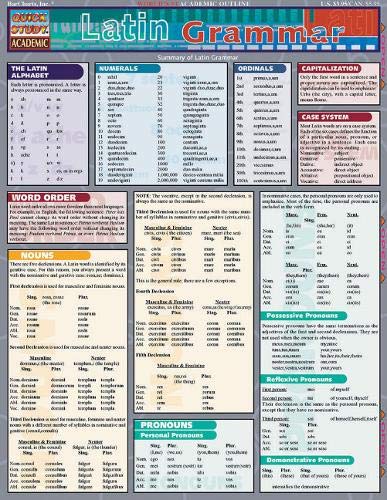Latin has left a massive footprint on the English lexicon: According to some estimates, 60 percent of its vocabulary ultimately comes from the language. English’s Latin derivatives come in a variety of shapes and sizes, from equality to grandiloquent to quid pro quo. Academic and abstract, many of these borrowings feel very Latin-y. But there are a number of borrowings so ingrained in the English language that we no longer even recognize that they’ve been lifted straight out of Latin.
1. EXIT
If you tell someone to exit the motorway, you’re telling them the third-person singular present indicative form of the irregular exeo: “he/she/it goes out.” That’s right: exit is just a Latin verb. English started using it in the early
 Getting Started with L...
Best Price: $8.84
Buy New $21.74
(as of 09:05 UTC - Details)
16th century for stage directions in plays, as seen in Shakespeare’s A Winter’s Tale: “Exit, pursued by a bear.”
Getting Started with L...
Best Price: $8.84
Buy New $21.74
(as of 09:05 UTC - Details)
16th century for stage directions in plays, as seen in Shakespeare’s A Winter’s Tale: “Exit, pursued by a bear.”
2. INTEREST
Interest is another Latin verb hiding in plain sight. In Latin, it means “it is important,” literally “to be between,” which might help explain its early application in English for legal and business transactions. Its general association of attention and curiosity doesn’t emerge until the 1770s.
3. PLUS
With its conjugations and declensions, Latin can seem intimidating to learn. But it’s as simple as two plus two equals four. No, really: Plus is a Latin preposition. It means “more.” The convention of using it for addition, though, comes about in medieval commerce.
 Latin For Dummies
Best Price: $2.57
Buy New $9.95
(as of 07:05 UTC - Details)
4. MINUS
Latin For Dummies
Best Price: $2.57
Buy New $9.95
(as of 07:05 UTC - Details)
4. MINUS
Like plus, minus was used for subtraction starting in the Middle Ages. It means “less” in Latin and is formed on the comparative adjective, minor, another Latin word easy to overlook in everyday English.
5. MINOR
The earliest minor in English was a Franciscan monk. St. Francis dubbed his order Fratres Minores, the “Lesser Brothers,” to hood themselves with humility. It’s been used to signify “less than” and someone “less than full age” since the mid-1500s.
6. MAJOR
 Latin Grammar (Quick S...
Best Price: $8.75
Buy New $8.95
(as of 09:20 UTC - Details)
Latin Grammar (Quick S...
Best Price: $8.75
Buy New $8.95
(as of 09:20 UTC - Details)
Major is major to minor: It’s Latin for “greater.” It also could mean an “adult” or “elder” in that language, which additionally explains minor’s meaning of “younger than the age of the majority.” We’ve been referring to academic majors in U.S. universities since the 1890s via a student’s “greater” focus of study.
7. VIA
Via, an English preposition “by way of,” is the Latin ablative case of via, a “way” or a “road.” Attested in reference to routes by the 1770s, via extended to a broader instrumentality, “by means of,” come the 1930s. It’s less obvious in obvious: This is from the Latin obvius, as something “in the way” is hard to miss.





